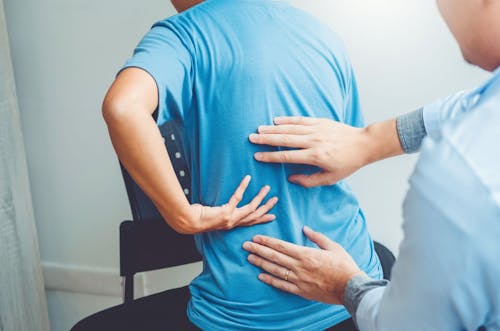Physical Therapy Can Help You Better Relieve Your Lymphedema Symptoms
You Can Live Life Comfortably with Physical Therapy!
Lymphedema is a swelling disease that typically affects the upper or lower extremities due to an excessive buildup of lymph fluid.
People with these symptoms may be aware that they have lymphedema in some cases, but in others, the condition may need to be diagnosed.
The lymphatic system is an essential component of both your immune and circulatory systems. It is a network of vessels that transport lymph fluid to the core of the body. When that system is not functioning properly, lymphedema can develop.
Because the fluid cannot drain properly if your lymphatic system is blocked, you may experience swelling in your arms or legs. Improper drainage causes a buildup of lymph fluid in your arms and legs, which can be dangerous if left untreated.
Fortunately, if you are living with lymphedema, there is a safe way for you to manage your symptoms: physical therapy. Make an appointment with Southern Physical Therapy Clinic today and let us help you find the relief you deserve!
What’s the difference between primary and secondary lymphedema?
There are two categories of lymphedema: primary lymphedema and secondary lymphedema.
Both of these conditions are difficult to deal with, but they occur for different reasons.
Primary Lymphedema
Primary lymphedema is either hereditary or develops on its own. The cause of primary lymphedema is not always apparent. Your primary care physician may want to take additional imaging tests to look at your lymphatic system and to rule out any potential conditions. These tests can include MRI scanning, CT scanning, Doppler ultrasound, or lymphoscintigraphy.
Secondary Lymphedema
Secondary lymphedema occurs as a result of a disease or disorder. It can also happen after a person is treated for cancer; oftentimes during surgical treatments, lymph nodes are weakened or removed entirely. Lymphedema can also be the product of a surgical procedure involving lymph nodes.
The most common causes of secondary lymphedema include:
- Radiation treatment for Cancer
- Infection
Symptoms of lymphedema typically occur in the arms and legs. Pain levels vary from moderate (noting slight changes or sensations in your limbs) to serious (noticing extreme changes or feelings in your limbs, to the point where they may be difficult to use).
Lymphedema can often take months or even years to develop as a result of cancer treatment.
The following symptoms of lymphedema are pretty common, and if you’re experiencing them, it’s important to contact a therapist as soon as possible:
- Restricted range of motion
- Heaviness/tightness
- Aching/discomfort
- Fibrosis
- Infections
- Swelling
What can physical therapy do for lymphedema?
While there is no cure for lymphedema, physical therapy is a safe and natural way to treat the symptoms.
Physical therapists are trained movement experts who can use a variety of strategies to alleviate your discomfort and teach you how to manage your symptoms at home.
When it comes to conditions that include persistent swelling, there are numerous complications to consider. These include circulatory problems, infections, and the possibility of injury.
Our Physical therapists at Southern Physical Therapy Clinic will conduct a thorough review of your condition and develop a personalized treatment plan to treat your specific case of lymphedema.
Your treatment plan will be based on your physical exam, medical history, and the severity of your symptoms. Manual therapy and pain relief exercises will be the focus of lymphatic care plans.
Manual therapy may be used by physical therapists to help manage your pain and symptoms. Manual lymphatic drainage is a type of manual therapy that is commonly used for lymphedema patients.
Manual lymphatic drainage helps lymph fluid flow to the upper and lower extremities. This can be supplemented with additional massages to improve circulation and promote relaxation.
One of our physical therapists will design an exercise program for you that will include gentle muscle contractions to restore function and increase your range of motion. Exercise of the affected limb(s) frequently promotes lymph fluid drainage.
If you have lymphedema, you must seek treatment and follow up with your doctor and physical therapist regularly to ensure that your condition does not worsen.
Wrapping, compression, or complete decongestive therapy may be added to your treatment plan as your physical therapist deems appropriate.
We can help you manage your symptoms – contact us today
Lymphedema may be interfering with your life right now, but it does not have to be that way indefinitely.
If you’re living with lymphedema and looking for relief, your journey begins right here.
To schedule an appointment at our clinic, please call us at (769) 242-2626 or click here. Southern Physical Therapy Clinic can assist you in reducing the effects of your lymphedema and improving your quality of life!


